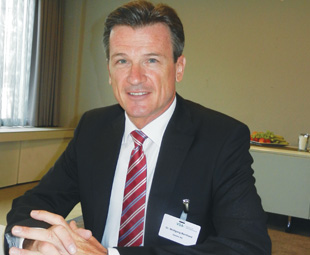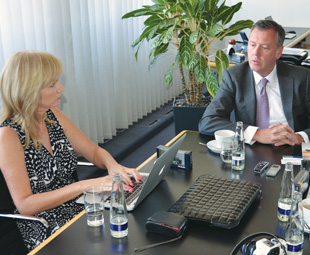South Africa: some concern, some confidence

Daimler and MAN have mixed feelings about the South African commercial vehicle market. Be warned: some drastic moves could be in the pipeline …
I have just returned from the VDA’s International Press Workshop (a truly fascinating affair; read all about it on pages 28 to 34 of this issue of FOCUS). While in Germany, I was able to meet with three of the most influential men on the global trucking landscape: Dr Wolfgang Bernhard, member of the board of management at Daimler; Anders Nielsen, chief executive officer of MAN; and Heinz-Jürgen Löw, member of the executive board (sales and marketing) at MAN.
It is, of course, slightly easier to interview Bernhard – Daimler is flourishing, both internationally and locally, but he is not complacent. I asked him if there were any manufacturers that he feared, and I could see him visibly sit up in his seat. “We respect every manufacturer and we take them seriously. Never underestimate a competitor! Always be wide awake and be wary! Don’t fall asleep! Whoever is too quiet will rust!” he responded instantly.
Be this as it may, Daimler is still looking pretty – whereas MAN isn’t having the best of times. Both Nielsen and Löw acknowledge this, although they insist that the situation will improve. I asked Löw about MAN in South Africa, and whether the management changes had impacted on sales. He didn’t think so.
“Yes, we have undergone some major changes. I asked Geoff du Plessis to bring the flock under control. I don’t think that the staff changes have impacted on market share. We have had some hiccups with our products. I had a very interesting meeting with our top customers. We have found the solutions, and we now have the problems under control,” he stated openly and confidently.
Nielsen, of course, has the challenging task of bringing the global flock under control. He concedes that this is a tough job. “It is my responsibility to get this company into safer waters and yes, it is a challenge, but of course I am enjoying it.”
 As part of his job, he is ensuring that all the necessary structures are in place. “We have to get the costs down, meaning optimising the production network. In the best of worlds, it doesn’t mean laying off people, but we need to leverage growth. We need a better profit level to finance our growth plans,” he revealed.
As part of his job, he is ensuring that all the necessary structures are in place. “We have to get the costs down, meaning optimising the production network. In the best of worlds, it doesn’t mean laying off people, but we need to leverage growth. We need a better profit level to finance our growth plans,” he revealed.
Löw, on the other hand, is focusing on the network of dealers. “The network is the backbone of our business. It is important for customers to really experience the quality and performance of the MAN vehicle. We have to speed up. We need a clear strategy here, and we need to steer the network development. It is no secret that I am not satisfied with our work in this area thus far,” he said, with characteristic honestly.
While Löw feels that work needs to be done in this area, he doesn’t lose sleep over the ongoing industrial action in South Africa. “Having lived in France for eight years, a strike is not something that can shock me too much. It’s most important to have a sound relationship with our workforce. We have ongoing discussions with our workforce in South Africa and I am not too concerned. We have been in South Africa for more than 50 years. We really know how to deal with local conditions …” he said.
Bernhard has a completely different opinion. “I am delighted with our factory in South Africa. The quality is good and the people are very motivated. However, we are affected by the strikes; they are affecting the entire transport and supply industry. We have had standstills because of suppliers and this is not good! It is up to the political leadership of the country to keep the social fabric together. The leaders need to balance the hopes of the population with what can be fulfilled!” he stressed.
 Clearly, this isn’t happening in South Africa. “I see some frustration with the progress South Africa has made thus far. If this situation continues, and the social fabric continues to deteriorate, we could see developments for the worse,” Bernhard commented.
Clearly, this isn’t happening in South Africa. “I see some frustration with the progress South Africa has made thus far. If this situation continues, and the social fabric continues to deteriorate, we could see developments for the worse,” Bernhard commented.
Could this mean that the Mercedes-Benz factory could close? “We are watching the situation very closely. We won’t rush into any decisions. South Africa is a good market. It is the springboard for the whole African region. It has potential, but we have to ensure that the social cohesion of the country is not falling apart …” he warned.
Surprisingly, none of these three leaders were hugely frustrated about the postponement of South Africa’s “clean fuel” regulations beyond 2017. The consensus was that, as long as they knew about the regulations (or lack thereof), they could deal with the situation. There are, after all, many other markets for their highly sophisticated trucks …
Published by
Focus on Transport
focusmagsa




